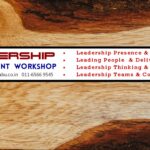Researches indicate that leaders who excel under pressure face the same level of stress and pressure that are usually found among top athletes and elite military units. One of the factors that differentiate great leaders from the rest is their ability to cope with pressure, thrive under pressure, and lead people in high-pressure situations. Leaders who thrive under pressure use pressure as a catalyst to bring out the best in one’s self and in others around them.
Leaders who excel under pressure don’t panic rather have control on one’s self and have calming effect on others around them. They demonstrate confidence and boost confidence in others under pressure. They impact how everyone experience pressure and influence everyone to respond positively. When under pressure they get everyone’s focus on key priorities to get things done rather than let worry takeover. They make things easy instead of adding more pressure and create climate of instability, confusion, and disagreement. They bind the team together and enable everyone to operate from their inner strength to overcome adversities under pressure than to give into pressure.
- When the pressure is low there is less action and involvement, when the pressure is high there is anxiety and unhappiness.
- One’s response to pressure is subject to both outcome expectation and perceived consequence.
- Perceived severity of pressure has relative impact on one’s response but emotional composure has moderating effect on one’s response.
- Be purpose driven than pressure driven: Instead of pushed around by the external sources of pressure and play catch-up, take proactive measures to set goals that are aligned to the vision and make every effort to achieve those goals. When setting goals, take measures to ensure adequate self preparation is undertaken so that plans can be implemented effectively. When a leader is purpose driven it is easy to identify challenges and workout an appropriate response ahead of time to handle pressures effectively.
- Manage Expectation: It is possible that one can get into the high pressure situation because unrealistic expectations of one’s self or perceived high expectation from others. Identify trace of factors such as desire to be accepted, protecting the projected personal image, maintaining relationships that may result in setting unrealistic expectations of self and from others. Performing well in different jobs requires different personal characteristics; therefore, it is worth objectively evaluating one’s expectations and expectations from others to identify challenges. This may lead to take measures to undertake necessary preparation to equip oneself effectively ahead of time than indulging in firefighting.
- Coping with change and uncertainty: High pressure situations often accompanied with varying degree of change and uncertainty that must be handled effectively. Change and uncertainty often causes anxiety and feelings of insecurity, thus making one panic and respond defensively rather than responsibly. It is necessary to keep check on one’s own emotions and feelings that influence one’s responses to pressures which may arise out of change and uncertainty. It is healthy to tune one’s reflexes and train one’s emotion, become more adoptable to respond objectively rather than being subjective and overwhelmed by one’s emotional vulnerabilities. Focus on what you have to do and do it instead of overwhelmed by what will happen and consequences thereof.
- Balance courage and Caution: Under pressure, an easy response is to quit or get over boarded with courage one can ignore signs of caution and become reckless. The need is to balance courage and caution. Demonstrate courage and resolve by overcoming fear of failure. Strengthen endurance and enhancing risk tolerance instead of accepting inability and concede defeat. While demonstrating courage it is necessary to exercise caution by being vigilant to track changes as it happens, and identify potential threats and inevitable consequences. Make pressure a comfort zone for self and others to operate from the courage zone – work towards building confidence in self and others. Come out in front instead of staying behind – take charge instead of letting the momentum take its course.
- Deal with Ambiguity and Complexity: In high pressure situations it is easy to be overwhelmed by the complexities and get lost in ambiguity thus make issues unrecoverable and create more confusion. Simplify, instead of making things more complex. Reduce issues to manageable levels by breaking them into manageable pieces. Focus on solutions instead of problems. Increase clarity to deal with ambiguity, through clarity work towards enhancing familiarity.
- Erred Judgement and Oversight: Get on top of pressure before it gets on top of you, because pressure can blur professional decisions and affect decision making. Avoid the error of going major on the minor and minor on the major thereby being oversight. Keep clear focus on issues at hand, be clear on what needs to be done, and stay connected with people whom you lead, focus on finding solutions. Take account of the time factors and response time required accurately while making decisions rather than impose unrealistic time-frames.
- Build yourself: Different pressure situations require specific concentration skills. Not every situation requires the same form of concentration – e.g Engineering jobs require focus and follow-through rather than big-picture concentration. Most people in pressure situations are so much into their own heads that they can’t read the audience or they are hypersensitive to negative clues. When a leader does not have the emotional maturity, internal strength, and skills, to deal with pressure -allows pressure to take toll on one’s emotions – there one responds to pressure inappropriately. Therefore build your internal capacity to cope with pressure, have positive attitude towards pressure, and be aware of how to approach high pressure situations. Don’t panic, take charge and have control on one’s self – it will have calming effect on others.
Researches indicate that leaders who excel under pressure face the same level of stress and pressure that are usually found among top athletes and elite military units. One of the factors that differentiate great leaders from the rest is their ability to cope with pressure, thrive under pressure, and lead people in high-pressure situations. Leaders who thrive under pressure use pressure as a catalyst to bring out the best in one’s self and in others around them.
Leaders who excel under pressure don’t panic rather have control on one’s self and have calming effect on others around them. They demonstrate confidence and boost confidence in others under pressure. They impact how everyone experience pressure and influence everyone to respond positively. When under pressure they get everyone’s focus on key priorities to get things done rather than let worry takeover. They make things easy instead of adding more pressure and create climate of instability, confusion, and disagreement. They bind the team together and enable everyone to operate from their inner strength to overcome adversities under pressure than to give into pressure.
- When the pressure is low there is less action and involvement, when the pressure is high there is anxiety and unhappiness.
- One’s response to pressure is subject to both outcome expectation and perceived consequence.
- Perceived severity of pressure has relative impact on one’s response but emotional composure has moderating effect on one’s response.
- Be purpose driven than pressure driven: Instead of pushed around by the external sources of pressure and play catch-up, take proactive measures to set goals that are aligned to the vision and make every effort to achieve those goals. When setting goals, take measures to ensure adequate self preparation is undertaken so that plans can be implemented effectively. When a leader is purpose driven it is easy to identify challenges and workout an appropriate response ahead of time to handle pressures effectively.
- Manage Expectation: It is possible that one can get into the high pressure situation because unrealistic expectations of one’s self or perceived high expectation from others. Identify trace of factors such as desire to be accepted, protecting the projected personal image, maintaining relationships that may result in setting unrealistic expectations of self and from others. Performing well in different jobs requires different personal characteristics; therefore, it is worth objectively evaluating one’s expectations and expectations from others to identify challenges. This may lead to take measures to undertake necessary preparation to equip oneself effectively ahead of time than indulging in firefighting.
- Coping with change and uncertainty: High pressure situations often accompanied with varying degree of change and uncertainty that must be handled effectively. Change and uncertainty often causes anxiety and feelings of insecurity, thus making one panic and respond defensively rather than responsibly. It is necessary to keep check on one’s own emotions and feelings that influence one’s responses to pressures which may arise out of change and uncertainty. It is healthy to tune one’s reflexes and train one’s emotion, become more adoptable to respond objectively rather than being subjective and overwhelmed by one’s emotional vulnerabilities. Focus on what you have to do and do it instead of overwhelmed by what will happen and consequences thereof.
- Balance courage and Caution: Under pressure, an easy response is to quit or get over boarded with courage one can ignore signs of caution and become reckless. The need is to balance courage and caution. Demonstrate courage and resolve by overcoming fear of failure. Strengthen endurance and enhancing risk tolerance instead of accepting inability and concede defeat. While demonstrating courage it is necessary to exercise caution by being vigilant to track changes as it happens, and identify potential threats and inevitable consequences. Make pressure a comfort zone for self and others to operate from the courage zone – work towards building confidence in self and others. Come out in front instead of staying behind – take charge instead of letting the momentum take its course.
- Deal with Ambiguity and Complexity: In high pressure situations it is easy to be overwhelmed by the complexities and get lost in ambiguity thus make issues unrecoverable and create more confusion. Simplify, instead of making things more complex. Reduce issues to manageable levels by breaking them into manageable pieces. Focus on solutions instead of problems. Increase clarity to deal with ambiguity, through clarity work towards enhancing familiarity.
- Erred Judgement and Oversight: Get on top of pressure before it gets on top of you, because pressure can blur professional decisions and affect decision making. Avoid the error of going major on the minor and minor on the major thereby being oversight. Keep clear focus on issues at hand, be clear on what needs to be done, and stay connected with people whom you lead, focus on finding solutions. Take account of the time factors and response time required accurately while making decisions rather than impose unrealistic time-frames.
- Build yourself: Different pressure situations require specific concentration skills. Not every situation requires the same form of concentration – e.g Engineering jobs require focus and follow-through rather than big-picture concentration. Most people in pressure situations are so much into their own heads that they can't read the audience or they are hypersensitive to negative clues. When a leader does not have the emotional maturity, internal strength, and skills, to deal with pressure -allows pressure to take toll on one’s emotions - there one responds to pressure inappropriately. Therefore build your internal capacity to cope with pressure, have positive attitude towards pressure, and be aware of how to approach high pressure situations. Don’t panic, take charge and have control on one’s self – it will have calming effect on others.





